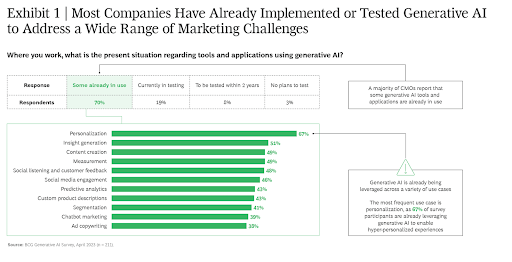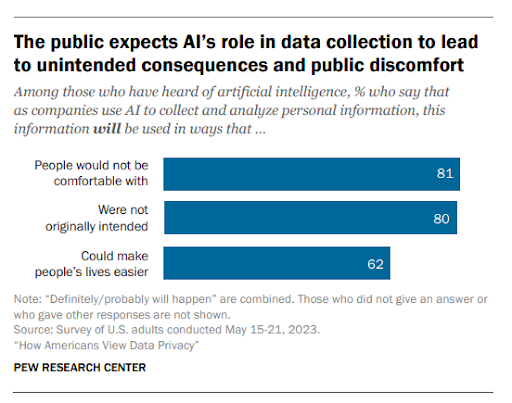Artificial intelligence (AI) has become one of the hottest trends thanks to the recent emergence of powerful generative AI technologies. If you’re like me, you’ve probably experimented with using tools like ChatGPT to create new recipes and write silly songs. Or maybe you’ve even tried to use AI to write email marketing copy and social media posts.

Most people associate AI with content generation, but that’s only one of many ways that this technology is transforming the digital marketing industry. AI email marketing can help you create more compelling, personalized, and timely content. And it can do so in a fraction of the time it would take to do it yourself.
AI email marketing may seem intimidating, especially if you’re not a computer science expert. You might worry that you’ll need to learn advanced programming or invest thousands of dollars to use this technology effectively. But the good news is that anyone can use AI to create successful email campaigns. This guide walks you through the benefits, uses, and future of AI email marketing.
What is AI-based email marketing?
Artificial intelligence email marketing uses machine learning techniques to help businesses make strategic decisions and improve their email campaigns. Machine learning uses algorithms — or sets of rules — to analyze data and make predictions. This technology enables marketers to understand their audience better, create tailored email campaigns, and increase efficiency.
What are the benefits of AI email marketing?
If you’re used to traditional forms of digital marketing, you may wonder if AI tools and techniques live up to the hype. AI email marketing offers numerous advantages over conventional methods.
Automation
Some email marketing platforms combine AI with powerful marketing automation technology. These tools handle tedious and routine tasks, such as scheduling emails to be sent when each recipient is most likely to open them. This feature frees up your schedule so you can spend less time fiddling with your email and more time working on the creative aspects of marketing.
Idea generation
Let’s face it: Marketing takes a lot of creative energy, and even top professionals can run out of ideas. You might spend hours writing and rewriting email subject lines or thinking of a witty call to action. AI speeds up this process by providing suggestions and helping you refine your ideas.
According to a 2023 BCG study, 49% of marketing organizations already use generative AI for content creation. The study suggests that this technology can improve productivity by approximately 30%.

Of course, AI isn’t a replacement for human content creators. AI doesn’t have the intuition and creativity of experienced marketers, and you’ll find that you’ll have to make some tweaks to get the content options to match your brand voice. However, AI is a useful tool to kickstart the brainstorming process and help you generate fresh ideas that you can mold into the perfect email marketing campaigns.
Improved personalization
No one wants to get spammed with generic and impersonal emails that are getting sent to a million other inboxes. It’s not personal enough and could leave subscribers feeling like they aren’t getting the value they signed up to receive. Email artificial intelligence marketing helps you avoid being the one sending out low-value messages. It uses machine learning algorithms to study users and predict what content will engage each individual.
The 2023 BCG study reports that 67% of marketing companies currently use generative AI to increase personalization. The software can analyze consumer data and use its findings to develop personalized subject lines, email content, and more.
Suppose your company sells pet supplies, and a new customer orders some of your products for their puppy. AI email marketing identifies their purchase and allows you to send hyper-personalized product recommendations, coupons, and newsletters with helpful tips about raising puppies. This content can evolve as the puppy grows and the customer’s needs change.
Increased productivity
Like most marketers, you probably have a constantly growing to-do list. Creating email with artificial intelligence increases efficiency and accuracy. That way, you can get more done quickly and move on to the next task on your list.
Say you want to send an email campaign about your brand’s newest makeup product to female clients aged 19 to 25. With traditional marketing methods, you might spend hours poring over a spreadsheet and manually creating a list of subscribers who fit your target demographic. You could overlook people during this time-consuming process or accidentally add people who aren’t part of your audience.
By contrast, AI email marketing allows you to automatically segment an email list based on age, gender, location, purchase history, and other criteria. This smart segmentation ensures clients receive only relevant emails. It increases customer loyalty and saves you time, boosting your productivity.
Predictive analytics
No one can see the future, but AI email marketing lets you make an educated guess. This technology uses sophisticated statistical tools to gain insights into consumers’ behavior, preferences, and needs. You can use these findings to identify future opportunities for growth and engagement.
For instance, you can use AI to gather data about clients’ browsing history on your website, past purchases, and social media engagement. Predictive analytics tools assess this historical data and anticipate what each customer will be interested in buying in the future. You can use these tools to create targeted email campaigns with personalized product recommendations and discounts.
Scalability
AI lets you quickly scale your email marketing campaigns up or down to meet demand. Say you have a huge sale on your products, and hundreds of people sign up for your mailing list overnight. You can use AI email marketing tools to quickly send personalized introductory emails and take advantage of the surge in interest.
How can AI assist your email marketing efforts?
AI helps you enhance your email marketing strategies and build stronger client connections. Here are four ways to leverage this technology to create powerful and timely content.
Newsletter email writing
According to Square’s 2023 Future of Commerce report, 86% of customers want to hear from companies they follow, and 60% prefer email communication. Sending newsletter emails regularly satisfies this demand and helps you build a loyal branding following. AI marketing technology can assist with every step of this process.
First, AI can build a custom newsletter email template that reflects your brand’s identity. Most readers skim newsletters instead of consuming all the content. AI can help you design every aspect of your template to make it as accessible and visually appealing as possible. Use this technology to optimize your layout for various devices, prioritize essential content, and incorporate your brand logo and colors.
AI also allows you to generate content for your newsletter emails. This tool can write attention-grabbing headlines and condense articles into one- or two-sentence summaries. Plus, you can use AI to insert dynamic content personalized for each reader, such as coupons and product recommendations. These strategies can make your newsletters more persuasive and compelling, leading to greater engagement and conversions.
Data analysis
Artificial intelligence gives you the necessary information to develop more effective email marketing campaigns. You can use this technology to gather many types of data about your email recipients, such as:
- Abandoned cart contents
- Conversion rates
- Geographic location
- Hyperlinks clicked
- Social media engagement
- Survey responses
- Time spent reading emails
- Type of device used
The AI uses predictive analytics and other tools to evaluate this data and detect patterns. For example, data analytics could reveal that you get the highest conversion rates when you include infographics in your emails and place your call to action in the introduction. Based on these findings, you can optimize future emails to increase the likelihood that readers will make a purchase or visit your website.
A/B testing
It’s not always easy to foresee how your audience will respond to your content, even with powerful data analytics tools. AI email marketing lets you perform A/B testing and analyze your results so you can gain a deeper understanding of your subscribers’ preferences.
A/B testing involves dividing your email list in half and sending slightly different emails to each audience. Let’s say you want to know if your subscribers respond better to subject lines that stress timing by creating a sense of urgency or subject lines that play on subscribers’s emotions. You can send Group A an email with a peppy headline and Group B an otherwise identical email with a funny headline. AI can help you analyze how recipients respond to your headlines in real-time and automatically determine the winner.
Deliverability analysis
Email deliverability refers to the percentage of emails that successfully reach your recipients’ inboxes. According to Validity’s 2023 Email Deliverability Benchmark Report, one out of six emails don’t land in inboxes. Instead, they get designated as junk mail or blocked by the email service provider.
Artificial intelligence email marketing tools address this issue by performing deliverability analysis. This technology harvests delivery rates, engagement metrics, and other data and compiles it into an email report.
You can also leverage AI to extract insights from this information and apply the technology’s recommendations to improve email deliverability. For instance, you could use AI to:
- Optimize your content to decrease the likelihood of it getting flagged as junk
- Generate subject headers that won’t trigger spam filters
- Delete invalid email addresses from your list
- Monitor and improve your sender reputation so email providers don’t block your content
Pros and cons of AI-driven email marketing
The number of marketers using artificial intelligence email marketing has increased from 26% in 2022 to 57% in 2023. Another 25% plan to incorporate this technology into their email campaigns soon.
AI email marketing has many pros that have contributed to its recent popularity, including:
- Cost savings: Economic turmoil has caused many companies to rein in expenses and look for new ways to streamline operations. AI email marketing can save money by automating routine tasks and improving efficiency. Marketers can use this technology to create more email campaigns without additional staff.
- High return on investment: AI-assisted marketing is one of the most efficient and affordable ways to increase the profitability of email campaigns. This technology can boost email deliverability rates, conversion rates, and customer engagement. Additionally, AI uses personalization to make each email more impactful and engaging. These benefits can lead to increased sales.
- Rapid data processing: AI platforms use machine learning algorithms to process vast data much more quickly than humans can. These algorithms improve their performance as they receive more data, increasing accuracy and efficiency over time.
- Informed decision-making: Marketers can use AI to analyze data and gain a deeper understanding of their clients, performance, and competitors. These insights can enhance decision-making.
However, AI-based email marketing does have several cons, such as:
- Privacy concerns: According to a 2023 survey by the Pew Research Center, 81% of respondents believe that people will not be comfortable with how companies use AI to gather and analyze personal data. Marketers should ensure their use of AI complies with applicable privacy regulations and ethical standards.
- Potential bias: Artificial intelligence can promote harmful stereotypes and discriminate against certain groups. AI-generated content often reinforces racial, gendered, and economic disparities. For instance, the Stable Diffusion XL generator produces pictures of thin, light-skinned people when asked to depict “an attractive person.”
- Misinformation: A 2023 Forbes Advisor survey found that 76% of respondents are concerned about AI promoting misinformation about businesses. It’s a valid concern: AI platforms like ChatGPT can “hallucinate” and provide false information. Marketers should verify content generated by AI carefully to help prevent this issue.

The future of AI email marketing
AI email marketing is evolving at a rapid pace. Here are a few trends that will likely emerge in the next few years:
- The use of AI to design more accessible email campaigns for people with disabilities
- Increased automation of marketing tasks
- Embedding AI-generated videos into emails
- Interactive emails with polls, games, and other features
Revolutionize your email campaigns
AI email marketing may seem complex, but new software makes it easier than ever to leverage this technology. You can use AI-based marketing techniques to boost engagement, increase productivity, and optimize your content.
Your customers will benefit from AI-powered campaigns, too. They’ll receive more attention-grabbing, personalized, and relevant emails that make them more informed and engaged.
Plus, you can use machine learning to analyze and hone your content continually. With AI-based marketing, your email campaigns will only get better and better.




